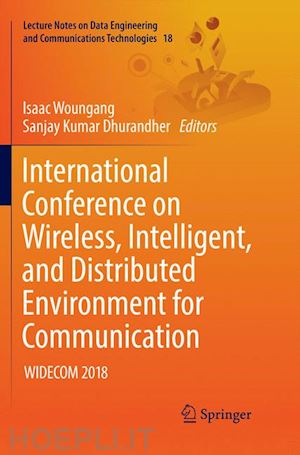
Questo prodotto usufruisce delle SPEDIZIONI GRATIS
selezionando l'opzione Corriere Veloce in fase di ordine.
Pagabile anche con Carta della cultura giovani e del merito, 18App Bonus Cultura e Carta del Docente
This book presents the proceedings of the International Conference on Wireless Intelligent and Distributed Environment for Communication (WIDECOM 2018), organized by SRM University, NCR Campus, New Delhi, India, February 16-18, 2018. The conference focuses on challenges with respect to the dependability of integrated applications and intelligence-driven security threats against the platforms supporting these applications.
The WIDECOM 2018 proceedings features papers addressing issues related to the new dependability paradigms, design, control, and management of next generation networks, performance of dependable network computing and mobile systems, protocols that deal with network computing, mobile/ubiquitous systems, cloud systems, and Internet of Things (IoT) systems. The proceeding is a valuable reference for researchers, instructors, students, scientists, engineers, managers, and industry practitioners, in industry, in the aforementioned areas. The book’s structure and content is organized in such a manner that makes it useful at a variety of learning levels.
Professor Isaac Woungang received his Ph.D. degree in Mathematics from the University of South, Toulon and Var, France in 1994. From 1999 to 2002, he worked as a software engineer in the Photonic Line Systems Group, Nortel Networks, Ottawa, Ontario, Canada. Since 2002, he has been with Ryerson University, where he is now a full professor of Computer Science and Director of the Distributed Applications and Broadband (DABNEL) Lab. Dr. Woungang has published 8 books and over 89 refereed technical articles in scholarly international journals and proceedings of international conferences and symposiums. He has served as Associate Editor of the Computers and Electrical Engineering (Elsevier). He is currently serving as Associate Editor of the International Journal of Communication Systems (Wiley), and Security and Privacy Journal (Wiley). He has Guest Edited several Special Issues with various reputed journals such as IET Information Security, Mathematical and Computer Modeling (Elsevier),Computer Communications (Elsevier), Computers and Electrical Engineering (Elsevier), and Telecommunication Systems (Springer). He has also edited a book on “Routing in Opportunistic Networks”, by Springer. He is presently a Senior Member of IEEE; and he has served as Chair of Computer Chapter, IEEE Toronto Section, from January 2012 to September 2016.
Professor Sanjay Kumar Dhurandher received the M.Tech., and Ph.D. degrees in Computer Science from the Jawaharlal Nehru University, New Delhi, India. He is currently a Professor with the Division of Information Technology, Netaji Subhas Institute of Technology (NSIT), University of Delhi, New Delhi, India, where he is also the Head of the Information Technology Department. He is even serving as the Head of the Advanced Centre CAITFS, Division of Information Technology, NSIT, University of Delhi. From 1995 to 2000, he was a Scientist/Engineer with the Institute for Plasma Research, Gujarat, India, which is under the Department of Atomic Energy, India. His current research interests include wireless ad-hoc networks, sensor networks, computer networks, network security, underwater sensor networks, opportunistic networks, and cognitive radio networks. Dr. Dhurandher is currently serving as an Associate Editor for the International Journal of Communication Systems and Security and Privacy Journal by John Wiley & Sons. He has also edited a book on “Routing in Opportunistic Networks”, by Springer. He is presently a Senior Member of IEEE.











Il sito utilizza cookie ed altri strumenti di tracciamento che raccolgono informazioni dal dispositivo dell’utente. Oltre ai cookie tecnici ed analitici aggregati, strettamente necessari per il funzionamento di questo sito web, previo consenso dell’utente possono essere installati cookie di profilazione e marketing e cookie dei social media. Cliccando su “Accetto tutti i cookie” saranno attivate tutte le categorie di cookie. Per accettare solo deterninate categorie di cookie, cliccare invece su “Impostazioni cookie”. Chiudendo il banner o continuando a navigare saranno installati solo cookie tecnici. Per maggiori dettagli, consultare la Cookie Policy.